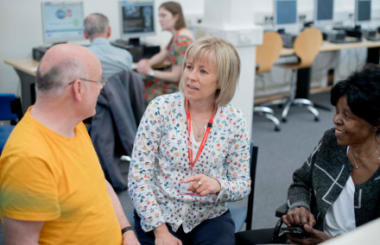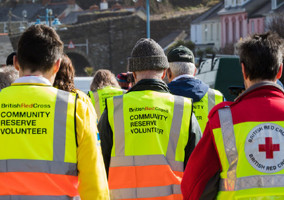It was welcome to hear the new minister for civil society prioritise building resilient communities in her recent interview with Civil Society News. It is my view that her commitment to building connections with and listening to charities, civil society and communities will be critical to the success of that ambition.
Our own work across the UK tells us that strong and meaningful connections are one of the most important factors in building resilience – individual resilience in the face of a bereavement or hospital stay, community resilience in the face of flooding or a major fire – and resilience as a country, as we go through a period of unprecedented political uncertainty preparing the UK to leave the European Union.
From our Connecting Communities service tackling loneliness to our Emergency Response work providing human-centred support to people following floods, fires, evacuations and even terror attacks, we have already learned so much about how to foster meaningful connections and the benefits they can bring in times of crisis.
Building connections
Building these connections is also particularly crucial with those in crisis on the margins of society – such as people left destitute as they seek asylum, or women who have been trafficked for sexual exploitation. These are the people who will benefit the most from both the personal connections British Red Cross staff and volunteers can offer, but also connections between government and the wider voluntary and community sector, and connections across government departments.
We hope to see greater joined up government working in future, such as the Department for Culture, Media and Sport – who hold responsibility for the loneliness brief – joining up with other initiatives such as the integration strategy which assists those with refugee status build new social connections – and building stronger links with NHS England, who are rolling out the NHS longer term plan including new investment in social prescribing.
It’s here I was also particularly pleased to read that the minister sees listening to charities as a priority, as last week saw the launch of the Loneliness Action Group (LAG)'s shadow report A Connected Society? Assessing Progress in Tackling Loneliness. Co-chaired by the British Red Cross and Co-op, the LAG has been acting as a ‘critical friend’ to government since its formation in 2017.
The connections forged between LAG members, and with government, provide a strong base on which to continue our work making sure everyone who is lonely gets the help they need to re-connect to their communities.
Commissioning and investment
The loneliness minister also emphasised the need to improve government commissioning through the voluntary and community sector – and I think it is here that better connections between national policy and the local reality are crucial. A ‘one size fits all’ approach will not work; the community needs and response to them will be different in areas with high health inequalities to those with greater assets.
We also cannot shy away from the need for investment – one example being the roll out of social prescribers. In areas with high levels of poverty and low levels of income, how much further capacity will there be within voluntary and grassroots organisations to develop new initiatives and take on new service users?
And it’s not just about money - investment in time spent building relationships between government, the voluntary and private sectors and communities themselves is crucial. That relationship building needs to play out at the national and local level. It’s necessary to enable the design of the right mix of approaches and partnerships. As sector leaders, we need to lean in much more to true collaboration in which we share purpose, resources and actions - in the interests of great outcomes for the people we serve.
|
Related articles












